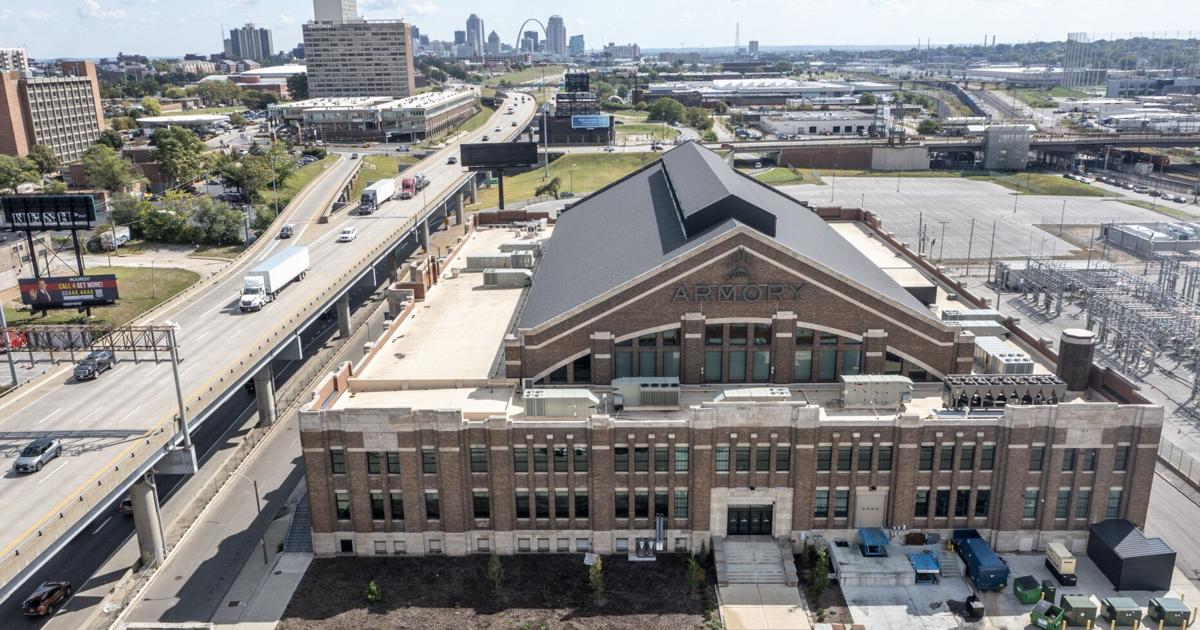
ST. LOUIS — A local real estate investor has plans to turn the shuttered Armory entertainment complex in Midtown into a data center, in what could be the first project to test the city’s new rules on the high-tech facilities.
Rod Thomas of Creve Coeur-based TriStar Properties has signed an option to buy the Armory from prolific city developer Green Street Real Estate Ventures for $25 million — and repurpose it as a data center, documents filed with the city of St. Louis show.
Moreover, Thomas has filed plans with the city to build a second data center on the Armory’s parking lot. Thomas recently told a neighborhood development board that the second data center alone would raise $20 million a year in taxes and employ 45 people full-time with average salaries of $130,000.
Green Street Principal Phil Hulse declined to comment Friday on the deal. Thomas did not respond to a request for comment.
The documents provide a first glimpse on the plan to turn the Armory, a sprawling former National Guard building just south of Interstate 64 near Grand Boulevard, into a data center, an idea floated after the venue suddenly closed in 2024.
Last month, a building permit was filed for a $600 million project on the Armory’s parking lot. While the permit didn’t reveal the specific plans, Thomas is expected to appear at a city hearing on Thursday about erecting a new building for “warehousing of data” on the lot, according to the meeting’s agenda.
That meeting will be the first time City Hall will review data center proposals under Mayor Cara Spencer’s new executive order regulating the facilities.
A global boom of artificial intelligence has kicked off a rush of data center development that consulting firm McKinsey estimates will balloon into a multitrillion-dollar industry in just five years.
But the facilities have also drawn opposition. They can occupy immense tracts of land and consume enormous amounts of energy, prompting concerns that they could displace other development, spike energy bills for the average consumer and drain water supplies. Data centers also typically employ few people, except during their construction.
In St. Charles, the development arm of construction giant Clayco sought to build five data centers on 440 acres along Highway 370. Residents pushed back against the proposal, citing concerns about water pollution, wildlife damage and tenant secrecy — city officials said they couldn’t reveal the user until after approval.
Within weeks, the city council enacted the region’s first moratorium on data centers.
Last week, St. Louis officials also proposed a one-year moratorium on the centers.
But labor unions and developers pushed back against the city’s proposed moratorium. Spencer then pitched a executive order instead.
Under the executive order, developers will be asked about any proposed data center’s job creation, distance from neighborhoods, anticipated power and water use and noise pollution, among other questions.
For Hulse, the Armory’s owner, the data center could inject much-needed cash into his struggling real estate company. Green Street, once the city’s biggest developer, was hit hard by the pandemic. As interest rates and construction costs rose, revenues plummeted and loan payments came due. Staff were laid off, and former employees, lenders and investors sued. Hulse’s partner at Green Street, Kevin Morrell, filed for bankruptcy.
Even prior to those troubles, Green Street struggled for years to redevelop the historic Armory, a sprawling 250,000-square-foot complex that once housed the National Guard, hosted Wimbledon champions Arthur Ashe, Jimmy Connors and Ken Flach and later big music acts like the Grateful Dead and Ike and Tina Turner.
The developer’s initial plans called for office space, though the office sector’s decline during the pandemic caused Green Street to try an entertainment concept instead.
Thomas, the buyer, referenced those troubles in a St. Louis Midtown Redevelopment Corp. meeting about the data center proposal earlier this year. He said that there are no other prospects for the site and that the Armory has been broken into several times. He warned that the entire complex could become a problem property.
But Thomas said a data center is an ideal use for it. It isn’t adjacent to residences, is situated between rail lines and Interstate 64 and is next to a large electric substation. Thomas said he has taken over the loan for the parking lot.
Water consumption would be metered, he said, adding that Ameren Electric supports the project. It may bring “efficiencies” instead of rate hikes, Thomas told the board.
In the option contract between Thomas and Hulse, both parties agreed that “repurposing the (Armory) as a data center is the highest and best use” for the property. Thomas was expected to pay Green Street $5,000 a month until he closed on the deal, documents show.
Redevelopment Corp. documents say Hulse could alternatively maintain ownership of the Armory. Hulse is working to “convert the building into an office and data storage space,” Thomas said in a meeting, according to the records.
Thomas in May also bought a property on Spring Avenue that’s located across the railroad tracks from the Armory. City documents do not describe plans for that site.
Thomas has until Dec. 31, 2027, to close on the deal to buy the Armory, documents show.
Any changes to how the Armory would be used would have to first be approved by the redevelopment corporation.
Be the first to know
Get local news delivered to your inbox!
* I understand and agree that registration on or use of this site constitutes agreement to its user agreement and privacy policy.
Steph Kukuljan | Post-Dispatch
Real estate and development
Get email notifications on {{subject}} daily!
Your notification has been saved.
There was a problem saving your notification.
{{description}}
Email notifications are only sent once a day, and only if there are new matching items.
Followed notifications
Please log in to use this feature
Log In
Don’t have an account? Sign Up Today



